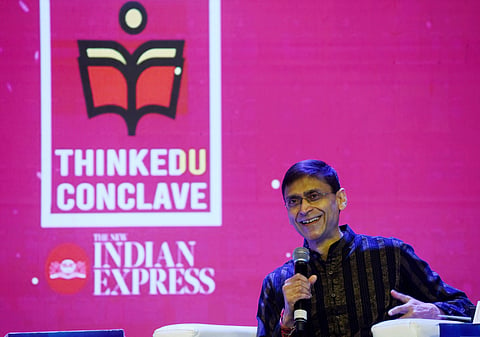

Education has been over politicised and under intellectualised in the country, stated Makarand Paranjape, author and professor at Jawaharlal Nehru University (JNU). Speaking on the topic 'Aspiring Bharat, Expanding India: Cultural Collision, Confluence or Co-existence?' at the 10th edition of ThinkEdu Conclave, he said that educational institutions should not be the ground of politics but its primary work should be to enhance knowledge of students. He was in conversation with Kaveree Bamzai, Senior Journalist and Author.
Paranjape said that India is surrounded by hostile powers and two nuclear powers, so we just cannot afford to have a weak India, a weak state and a divided civil society, with caste wars and social class conflicts. "Why do we need this divisive narrative forced upon us day in and day out?" he pointedly asked. Factors like language, religion and culture should not act as divisive forces, all can co-exist peacefully, he said. He added, "When it comes to education, we should separate politics from knowledge. We should be free of prejudice in India and free of these divisive narratives. There should be decent dissent."
Speaking about students opting to study higher education in Ukraine and other foreign countries, Paranjape pointed out that the main reason behind it is the prevailing quota system in the country. "Students who want to pursue higher education, we are pushing them out as we don't have enough seats for them. And the main problem behind it is that every seat is attached to a quota," said Paranjape. He added, "We are the only country in the world where there is a quota for everything. There is something dreadfully wrong in it. How can we compete when we are shackled with this system?"
He further said that the only solution to this problem is to look beyond the quota system. "When everything is equal, then we can prefer the underserved, the underprivileged but definitely cannot have ten different quota lists and you cannot run everything through quotas. If we continue this system, we can never become viswaguru," said Paranjape. He said that the amount of money spent on education by students going abroad and by the Centre is staggering but the end result is nowhere near to commensurate. Not a single university in the country is in the top 100, nor have we produced a single Nobel laureate after independence in science, economics or any other subject, he noted. He said that collective efforts should be taken to improve the quality of our universities and educational institutes.
Advising the youth, he said that, "Nationalism cannot be so thin-skinned that you cannot even tolerate constructive criticism." He also expressed concern over India becoming a polarised society. "India is very liberal. We should be open and more compassionate in listening to each other's views," said Paranjape.
ThinkEdu 2022 is the grand tenth edition of what has consistently been India's biggest education conclave for a decade now. March 8 and 9 will see some stalwarts of India's academic, economic and political ecosystems bring ideas, ideologies and reflections on the past, present and future of India's education system. The sessions will be viewed by a live audience, in addition to the 2,750 registered users on the conclave's digital space. Over the last nine years, the conclave has seen some true stalwart thinkers such as former presidents Dr APJ Abdul Kalam and Dr Pranab Mukherjee, MPs Jairam Ramesh, Smriti Irani, former CM of Jammu and Kashmir Farooq Abdullah, NITI Aayog's CEO Amitabh Kant and spiritual guide Sadhguru.
